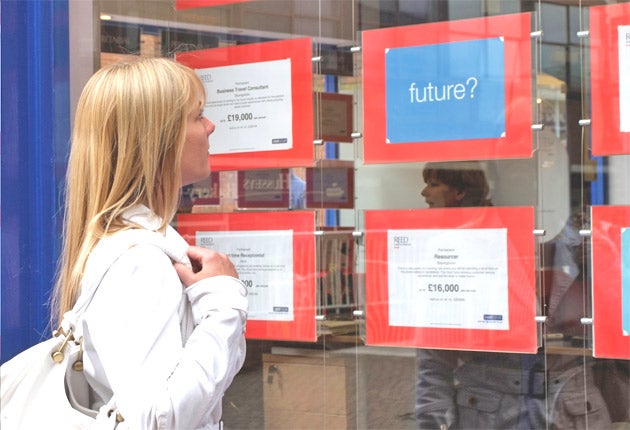Joblessness falls thanks to rise in part-time work

Despite a fall in the overall figures for joblessness, more than three-quarters of a million Britons have been out of work for more than a year, according to the latest official figures – and such jobs as are being generated are increasingly part-time and temporary. Some 1.6 million people are now in part-time employment – a record – because they cannot secure a conventional full-time job.
The long-term casualisation of the UK labour market, which has seen a decline in traditional full-time jobs with pension provision in sectors such as manufacturing and construction, but also services, appears to have been accelerated by the recession. The outlook for the 600,000 public-sector workers who, according to a Treasury leak, will need to find new positions over the next few years appears poor, at least if they want jobs that compare with the security, terms and conditions they previously enjoyed. There is also evidence that the jobs market for graduates is now so weak that they are competing for roles usually performed by school leavers. Unemployment among 18- to 24-year-olds fell back a little, but the proportion of 16- to 17-year-olds out of work has risen to 35.9 per cent.
Headline unemployment fell by 4,000 in the three months to May, leaving 2.47 million out of work, or 7.8 per cent of the workforce, a comparatively good performance among the major advanced economies. The "claimant count measure" – lower because not all of the unemployed are eligible for job seeker's allowance – also fell, by 20,800 between May and June 2010, and stands at 1.46 million. The number of people in work in the three months to May also increased by 160,000. But the driver of growth here was largely due to part-time employees increasing by 117,000, and self-employment, increasing by 59,000.
According to the Office for National Statistics, 552,000 people are in temporary work and 1.1 million in part-time work "because they could not find full-time work": an all-time high. It suggests that government schemes, financial pressures and the scarcity of vacancies are pushing people into taking work which they do not wish to do. While this will help keep some "in touch" with the world of work, it also suggests that private-sector employers are reacting to a halting recovery by taking on staff only on a tentative basis.
There are other sources of hidden unemployment: the number who describe themselves as "students", for example, is up 143,000 on this time last year, far beyond any real increase in places in colleges and universities.
For recent graduates, prospects seem bleak, and perhaps bleaker for those who have to leave school at 16. Charities working with the young confirm that the paucity of opportunities for graduates is forcing them not only into part-time work but also to take jobs from school leavers. A spokesman from the youth charity the Prince's Trust said: "Young people leaving school at 16 with few qualifications are being pushed further from the jobs market, as they struggle to compete with unemployed graduates.
Nigel Meager, director of the Institute for Employment Studies, commented: "Official figures are yet to register a major downturn in public-sector employment, but this will inevitably follow. Recruitment to public administration has dropped dramatically, with less than one vacancy per 100 employees, lower than any other sector apart from construction, and half the level of a year ago.
"It is of serious concern that long-term unemployment has increased again to over three-quarters of a million. Urgent action is needed to support this group back into work to avoid the damaging long-term social impacts experienced in previous recessions."
For those still in work, pay rises are failing to keep up with inflation. At a time when the Retail Price Index measure rose to 5.3 per cent a year, earning growth remained very weak: it was just 1.4 per cent in May.
Case study: 'I need experience for a job, but a job to get experience'
Lauren Moulsley, 18
Getting work has been a lot harder than Miss Moulsley, a school-leaver, had hoped as she knuckled down to her final year of studies. She spent several months attempting to get part-time work before setting up herself as an Avon lady, and over the past two months has tried, without luck, to get a full-time job doing "anything in retail".
Her problem is the all-too-familiar vicious circle of needing a job to get experience but being told she needs experience to get a job. "I've been told I don't have any experience so they aren't going to take me on," she says. "A lot of places are saying they prefer experience and they have so many people applying that they give priority to people who have it." A year ago, she began looking for part-time work to fit into her A-level schedule and eventually, on the day she turned 18 in March, she was able to start selling Avon products as a self-employed representative.
The work, said Miss Moulsley, of Reading, has given her an income while providing her with valuable insights into how to run a business and how to sell. "I do love working for Avon because it's so good for my confidence. I've built up lots of business skills from selling the products," she says. She is confident it will, sooner or later, help win her a first full-time job.
Subscribe to Independent Premium to bookmark this article
Want to bookmark your favourite articles and stories to read or reference later? Start your Independent Premium subscription today.

Join our commenting forum
Join thought-provoking conversations, follow other Independent readers and see their replies